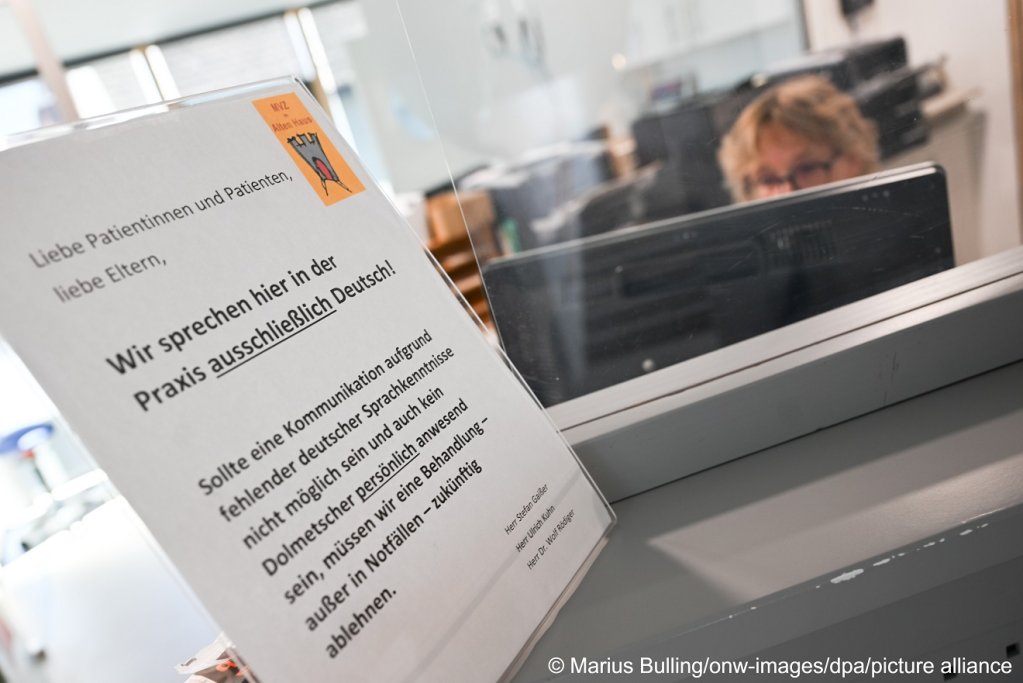A pediatric practice in Germany is not treating patients who do not speak German without an interpreter. Many have called the policy racist and discriminatory. The doctor said it was necessary for the welfare of both patients and doctors.
The small sign posted at the reception desk of the doctor's office was enough to cause a major uproar, the German news agency dpa reported Wednesday (July 31).
The sign read, "We only speak German!" was posted at the clinic of Ulrich Kuhn, a pediatrician in Kirchheim unter Teck, just outside Stuttgart. Patients who do not speak German must come in with an interpreter.
The sign was met with outrage online by people who called the policy racist, discriminatory, and unfair.
Kuhn, 60, insisted that his clinic's policy had nothing to do with discrimination and that his main motivation was providing the best possible care for children.
In a video interview with dpa, Kuhn explained that an increasing number of parents and children arriving at the practice could not understand German, making effective communication and treatment difficult, if not nearly impossible.
"We simply couldn't communicate crucial medical information to patients and their parents," Kuhn said.

Kuhn has been running his practice for more than two decades and sees around 3,500 children every quarter. In recent years, more and more patients with a migrant background are coming to his clinic. He estimates that every second patient is a foreigner.
Kuhn added that treating children, especially when it comes to administering vaccination, necessitates getting to know a patient's medical history such as allergies. Developing treatment plans for other ailments is made difficult and precarious without an understanding of a shared language.
"In the context of vaccinations, we risk violating both the German Civil Code and even the Criminal Code every time we proceed without clear communication," he said.
Kuhn, however, stressed that in case of emergency, patients would not be turned away and would still be treated even without an interpreter.
The controversial sign, which also reads: "If communication is not possible due to a lack of German language skills and no interpreter is present, we will have to refuse treatment in future – except in emergencies" confirms this.
According to the Baden-Württemberg State Medical Association, doctors have the prerogative to refuse treatment under various circumstances, including significant communication barriers.

Mixed reactions
According to Kuhn, there has been no negative feedback from patients. In fact, he noted that many parents, including those with a migrant background, have complied by bringing interpreters to appointments. Another pediatric practice on Lake Constance reportedly requested permission to use a similar sign.
Despite this, reactions outside the practice, particularly on social networks and in online reviews, have been varied. While some express understanding, others strongly criticize the policy, with comments describing it as "disrespectful and racist."
One woman interviewed by dpa said that while it was acceptable to ask that an interpreter be present, she could not agree to not being treated by a doctor for simply not speaking German. "There are other possibilities instead of just refusing to treat the patient," said the woman who has a 12-year-old daughter.
Kuhn acknowledges these accusations but insists that the policy will remain in place. "We know that this is not our motivation – that's why I am not extremely interested in the opinions of people who have nothing to do with our practice. I deal with my patients and their parents. And that's where it works," he stated firmly.
Ultimately, Kuhn and his team believe that their policy is essential for effective treatment and legal protection.
"This sign is not discriminatory," Kuhn said. "It has nothing to do with discrimination but with reality. If there is no interpreter and patients don't understand us, we aren't actually allowed to treat them. If we do it anyway, we are constantly operating in a legal grey area."
Germany: suffering from a shortage of doctors
Germany's doctors are aging and there are fewer and fewer people to replace them. In May, Euronews reported that an estimated 80,000 doctors in Germany are over the age of 60.
Many doctors are reportedly expressing concern that when they retire, finding someone to take over their practice will be difficult.
Data from the National Association of Statutory Health Insurance Physicians (KVB) for 2023 indicate that a number of German states are already struggling with a shortage of doctors.
In the northern city of Hamburg, there are an estimated 1.9 general practitioners per 1,000 people while in Bremen, there were only 444 general practitioners living in the area in 2023.
Still, Germany is much better positioned compared to other industrialized countries. According to Statista, Germany has about 4.5 doctors per 1,000 inhabitants while France only has 3.4 and the US about 2.7.

Shortage of doctors: A regional ticking time bomb
The World Health Organization (WHO) warned that the shortage of doctors across the European Region and Central Asia is a ticking time bomb.
In 13 of the 44 countries that reported data have a workforce in which 40 percent of medical doctors are already aged 55 years or older and nearing retirement. The WHO estimates that the region has about 37 doctors per 10,000 people
Additionally, medical personnel cited in the study reported having poor mental health. Long working hours, staff shortage, and inadequate medical support have contributed to the mental health burden of medical workers.
